


VOL. II NO. 46 REG NO. L5015 DELHI, THURSDAY JULY 27, 1944.
30 JAPANESE TAKEN PRISONERS FOR LARGEST BAG IN ONE DAY
NORTHERN BURMA - Lt. Gen. Joseph W. Stilwell's forces continued to tighten the noose around the Jap garrison at Myitkyina this week. making notable gains in both the north and south sectors of the city after fierce house-to-house fighting.
In the Missions School area of Myitkyina, advances ranging up to three blocks were achieved, while in the railroad yards along the Radhapur Road, substantial gains were made and a number of Japanese were killed.
On one day, more than 30 Japs were killed and 30 more taken prisoner, the largest number of prisoners taken in any one day's engagement during the North Burma campaign.
The Southeast Asia Command reports that the last of the Japanese have been driven from the Imphal plain. Bad weather has hampered pursuit of the retiring Japs along the Tiddim Road.
In the Arakan, heavy rain has restricted all activity to patrol operations.
ALL IN THE FAMILY DURING BURMA ATTACK
NORTHERN BURMA - From the bailiwick of the Burma Banshees, a fighter squadron operating out in the wild elderberry league, comes the latest addition to the unusual-reunion-overseas file.
Lt. Robert N. Gale, of Winters, Calif., was leading a flight of P-40's on a dive-bombing mission over a city held by the Japs but under attack by Chinese and American troops. After the bombs had fallen, Lt. Gale heard the radio liaison station on the ground call: "Is there a Lt. Gale in the flight overhead?"
Gale told the ground that he was there and the next voice he heard was that of his brother, S/Sgt. Donald Gale, 20, Infantryman, whom the flying Gale hadn't seen since California on Jan. 1, 1943.
A meeting was arranged, and the brothers were able to spend several days together.
|
THIS CAPTAIN SAD SACK
Listen, chillun, to another of life's minor tragedies -
This Air Corps captain receives orders to return to Shangri-La.
But before leaving he plans to make a sharp business transaction which will net him rupees ample. For this purpose, he has three expensive watches, a number of Parker, Shaeffer and Eversharp pens and pencils and some garden variety miscellany. All this, which he has brought to CBI from Uncle Sugar, he intends to exchange for a rare jewel.
Our next scene finds the captain at Ganeshi Lall and Son at Agra, where his eyes are bedazzled by a "cat's eye stone" which the man behind the counter, batting nary an eyelash, informs him is worth Rs. 1,200. The trade is made.
But our hero's mind becomes clouded with suspicion during the night, and on the following day he returns to the gem shop to call off the deal.
This, another clerk informs him sadly, is impossible. Several of his articles have been sold already.
The scene then shifts to Delhi, where the captain, now more apprehensive than somewhat that he has been
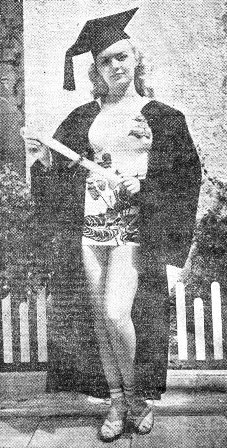 June Haver, 20th Century-Fox starlet, poses in the traditional cap and gown, but adds a little modern "oomph" in
the form of a bathing suit. The lovely June was among 393 students to graduate from University High School of Los
Angeles.
June Haver, 20th Century-Fox starlet, poses in the traditional cap and gown, but adds a little modern "oomph" in
the form of a bathing suit. The lovely June was among 393 students to graduate from University High School of Los
Angeles.
|
Worst blow to fall, however, comes at a branch office of Ganeshi Lall and Son, where the stone is valued at Rs. 250.
So our hero brings his troubles to the Provost Marshal.
Here he learns two sobering facts:
1 - He has been financially clipped. (His item is worth Rs. 200 and the articles he turned over in exchange for it are valued at Rs. 1,650.)
2 - It's against Army Regulations to bring articles into the Theater for the purpose of bartering.
He protests the innocence on Point No. 2, explaining it's the first time he has heard of the law.
Instead of winging toward Shangri-La, he's now on his way back to Theater Headquarters to do a "little explaining."
Now don't you agree that's a sad story?
ANN SHERIDAN ON WAY
TO CBI, IT SAYS HERE
Even Capt. Melvyn Douglas, refugee from Hollywood's kleig lights and now CBI-land's most on-the-go Special Service wallah, is all atwitter, although the lucky guy has probably swapped soulful screen busses with most any fillum lovely you can name.
But it isn't every day that even Douglas can welcome Ann Sheridan to our neck of the world, and that's what he'll do when the Oomph Gal's plane touches down on the runway of Delhi Airport. This momentous event is scheduled to happen almost any moment now.
Ann's trim ankles will lead a parade of five performers down the plane's ramp, and they will entertain G.I.'s for the next two, possibly three, months under the auspices of USO Camp Shows, Inc.
According to Douglas, the incendiary redhead will be supported by Ben Blue, Jackie Miles, Ruth Denas and Mary Landa, who dance, sing, squeeze the accordion and make with the jokes.
One USO show is already touring the weeds to the satisfaction of G.I.'s. This outfit is composed of Jack Cavanaugh, Gene Emerald, Basil Fomeen and Joe Tershay; and Douglas confides that they are waging a winning battle on the Entertainment Front.
Here is a shipment of G.I.'s who will be nearing the shores of Shangri-la by the time this week's Roundup reaches you. Security dictates that the time and place of the embarkation be withheld, but the pictures speak eloquently even without that particular information.
Admittedly, not everyone who has been in CBI-land for over 24 months is yet aboard a homeward-bound ship. But, for two justifiable reasons, you shouldn't expect rotation machinery to start functioning at top speed right away, just as you shouldn't expect a jeep to leap off the mark at 60 miles per hour from a dead standstill.
Point One to consider is that the Rotation Plan started with the disadvantage of a backlog. Point Two to weigh is that the War Department dictated that only one percent of Theater personnel return home per month and that, unless waived by unit commanders, each rotationist must await arrival of his r5eplacement.
However, the Replacement System officer expects before the year is spent that the backlog will have been melted considerably and the time between eligibility and departure will have been narrowed to a more modest interim.
Preference, he reports, will continue to be given to the men in the forward areas and those with the most arduous duties.

A 30-month Hitch |

25 Months Training Chinese |

Transportation Corps 27 Months |
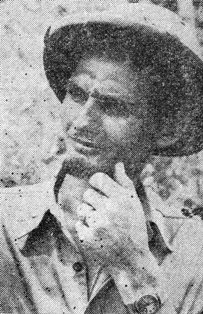
18 Months in Old Cathay |
 This boat load of G.I.'s got their first look at India as they awaited orders to be transported to various sectors
of the C.B.I. Theater.
This boat load of G.I.'s got their first look at India as they awaited orders to be transported to various sectors
of the C.B.I. Theater.
|
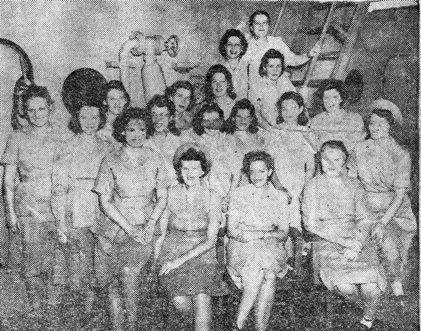 The newcomers were scheduled to replace personnel overseas two years, among them these Army nurses, the first
contingent to reach CBI-land.
The newcomers were scheduled to replace personnel overseas two years, among them these Army nurses, the first
contingent to reach CBI-land.
|
 G.I's unload barracks bags from trucks at the docks, preparatory to boarding the ship that will take them home.
G.I's unload barracks bags from trucks at the docks, preparatory to boarding the ship that will take them home.
|
 Then up the gangplank they clambor, leaving India behind.
Then up the gangplank they clambor, leaving India behind.
|
 But they'll take mementos with them, such as these souvenirs they've collected throughout the Theater.
But they'll take mementos with them, such as these souvenirs they've collected throughout the Theater.
|
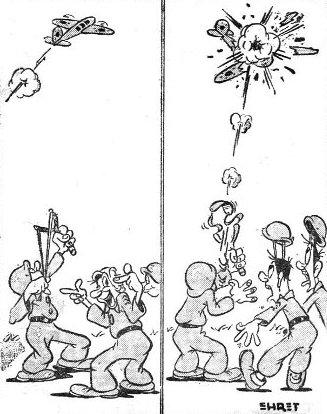
|
Trouble
FOR SIGNAL CORPS ON LEDO ROAD
LEDO ROAD - A Signal Corps outfit along the Ledo Road was cited recently for "a high degree of ingenuity, resourcefulness and persistence, having overcome handicaps of terrain and climate."
The citation erred on the side of understatement. Let T/Sgt. W. J. Satterwhite, chief line foreman, tell his sad story, well worth a T/S slip:
"Our trouble shooters get up in the middle of the night to fix a wire breakdown. Sometimes it's an act of nature, but ofttimes it's a act of man.
"One night we were aroused about 3 a.m. We set out in a downpour of rain. We traced down that short to find that some Chinese soldiers had wrapped the wires together and then put the phone under a tree to dry.
"On another occasion, Sgt. Jack Coubome led out a gang to trace sections of 75 feet of wire that disappeared every night. After a week, he found that some Kachins were swiping the wire to use as clothes lines.
"Another time, a spiral cable was found out, with a bucket placed underneath. The cable resembled a small pipe and it developed some thirsty Indians expected water to gush out.
"We never had any of those problems brought up in basic training," sighed Satterwhite.
Meanwhile, the fight to keep the Signal Corps lines open continues.
CHINESE ESCAPE JAPANESE NOOSE
CHUNGKING - Reports from the Chinese high command here state that a strong force of Chinese troops has broken out of encircled Hengyang and is attacking the local headquarters of the Japanese at Hengshan. The report also states that the Chinese in Hengyang continue to repulse Jap thrusts at the city.
American bombers of the 14th Air Force have given strong support to the Chinese defenders of Hengyang and have made repeated and successful attacks on Changsha.
Chinese Battle To Reopen Burma Road In Monsoon Mud
By ALBERT RAVENHOLT United Press Correspondent
WITH THE CHINESE EXPEDITIONARY FORCE ON THE SALWEEN FRONT - The Chinese push to meet Lt. Gen. Joseph W. Stilwell's Allied Army coming from India isn't a brilliant campaign of rapid overnight maneuvers that either throw the enemy off balance or leave him astride the Chinese line of supply; it's a man-consuming 24-hour-a-day task of crawling 1,000 yards up a mountain in the face of Japanese guns firing down the slopes or marching four days over a forgotten trail to out-flank an enemy-held pass.
With the coming of the monsoons, The Chinese drive to help clear a path for the Burma-Ledo Road has become an even tougher test of Chinese offensive potential.
During the past two years, the Japanese built defense points up in the clouds along the crests of the Kaoli Mountain Range. They stocked each position with rice and ammunition and surveyed every land feature within sight for mortar and artillery fire.
South of the Burma Road, Chinese troops, after completely isolating a company of Japanese on a mountain, sent the enemy a letter suggesting they come out and surrender. An approximate translation of the Japanese reply read:
"Why should we? We've got two months stock of rice and ammunition. If you want this mountain, you'll have to come and try and drive us out of it."
At present, the Japanese are struggling to hold the inner heart of their defense block for the China-Burma border - a triangle hinged in the north on Tengchung and in the south on the Burma Road at Manshih and Lungling. The enemy, since he captured Tengchung on March 10, 1942, has built truck roads heading north from the Burma Road at Lungling throughout the Shweli River Valley. Rice stocks have been commandeered from the local population and stored underground. Wire entanglements and underground tunnels encircle Tengchung where the Japanese 56th Division has its headquarters in this former British Consulate General - heavily sand-bagged and complete with a bomb-proof underground shelter.
The Chinese have committed in the Salween drive the majority of the forces trained and supplied during the past year by Brig. Gen. Frank Dorn's American Y-Force. Troops from all sectors of China have been trained at the U.S.
|
The Chinese soldier in this campaign has left an indelible impression upon the Americans who have fought with him. Until rain coats were dropped in to him by U.S. troop carrier planes he fought on the torrid banks of the Salween and in the sleet and cold on the mountains in the same scanty cotton shorts and shirts. Chinese transport battalions in a desperate effort to supply the front with rice and ammunition died by the hundreds from exhaustion or fell from precipitous mountain trails into crevices below. In frontal charges on Japanese machine gun nests, Chinese units took casualties, American officers said, no Western army would ever had been able to take and continue on.
The American liaison teams live perhaps the most rugged campaign life of any U.S. Army unit in action anywhere in the world.
On some sectors of the front, they live on red rice and one half of a small can of "C" rations per man daily. The Americans with their Chinese allies scrounge through the deserted mountain villages for anything green that can be eaten. Pack horses that have died by the side of the trail are immediately skinned and divided up. Half wild pigs left to roam by native peasants who've fled are shot and boiled - there isn't enough fat on the hogs to fry them in.
Lt. Col. Oscar R. Zipf, Freeport, Ill., who had been helping the Chinese direct air support on the mountains, described a day when the Americans finally found a fat pig.
"Some of the American boys in my radio team found that pig - he was well filled out the way pigs should be - in the corner of a mud compound. We were all sitting around the fire, bearded, soaked and hungry that evening, when they proudly dragged the squealing pig in. The sight of our guns and drawn knives as we jumped up must have been too much for him. He broke away and scampered down the mountain. There wasn't any chance of catching him. That night, some strong men sat down and nearly cried. The next day, the boys spotted that hog again on a ridge. They shot him and cut his throat immediately."
The campaign to date has been costly and slow, but the Chinese with their crossing of the Kaoli Range and entry into the Shweli Rover Valley have won the first and most difficult round.
Prisoners report that some Japanese units have lost more than 50 percent of their strength. Chinese soldiers, though they've suffered, have also gained confidence for the first time in seven years, seeing the enemy steadily pushed back. Some Chinese commanders have overcome an original hesitancy, perhaps born of seven years of defensive war, to strike daringly forward.
With the growing Japanese pressure on Eastern China and the Allied capture of Northern Burma, the opening of a supply road has become of even greater strategic importance to future military action in China.
One of the most brilliant generals in the Chinese Army said recently when asked if it might not have been better to have diverted some of the troops now fighting across the Salween River in an effort to help hold the Canton-Hankow Railway:
"The Japanese drive against Eastern China only makes this difference - that we've got to push through Northern Burma so much sooner."
INDIAN RAILWAYS ENSNARE TRIO OF OUR ALLIES
INDIA - At an American base in India three slightly-bewildered Chinese are eating G.I. chow as they await word from their Government as to their destination.
The Chinese are victims of the Indian railways. They started out with full equipment, an officer and other men of their organization from a seaport town. Stopping off at an obscure way station to wash, they found that their train and companions had vanished when they returned to the platform.
Puzzled British M.P.'s, not knowing what to do with the three stranded Chinese who were on the loose in India in nothing more than underwear, turned them over to an Indian Guard Regiment.
The Indians gave them whatever clothing was available, fed them with chipatis for a week and then decided they were an American problem.
The Chinese are frankly enjoying their stay with the Yanks and hit the sack and chow line with regular G.I. gusto. When asked their opinion of the Indian chipati, or cup-cake, they clutch at their throats and stomach and shake their heads.
There has been only one occasion when an international incident almost occurred. That was when an M.P. asked them, "You Japanese?" It took the entire guard relief to pull our Chinese allies off the shaken M.P.
WEATHER 'LEVELS' LEDO
BUT JAPANESE TAKE THE BOWS
According to word just received in these parts, the local climate and the Japs added insult to injury up at Ledo a bit ago.
After the monsoon had got the dust nicely wetted down with 18 or 20 inches of rain, along came a 50-mile wind and started remodeling the bashas. Some were removed in sections and deposited in the Naga Hills.
The next night, the Japs chucked in their two-bits worth. Said the Tokyo radio: "Ledo has been bombed . . . and leveled."
Another triumph for the Jap espionage system.
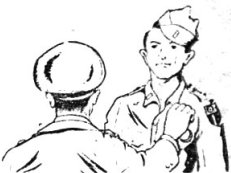 Oak Leaf
Oak LeafAWARDED FOR SECOND JILT
HQ., 14TH AIR FORCE, CHINA - This headquarters has a young but fastly-growing organization called "The Torch Bearers." It is made up of six young officers whose girlfriends have jilted them while they were overseas.
One of them broke the record this week when he announced his "spare" had jilted him also, making two jilts for the war.
The executive committee voted to award him an oak leaf cluster.
And Sudden Death
ASSAM - A tiny rift in the clouds of monsoon-ridden Northern Burma brought about the destruction of four Japanese planes recently and the shooting up of eight more.
At its best, flying is precarious during the rainy season and scores are low, but on a recent patrol a flight of Burma Banshees, a unit of the 10th Air Force, EAC, encountered extremely bad weather. They saw a small hole in the clouds and went down. To their amazement, sitting right under them, partially camouflaged with leaves and branches, were 12 enemy planes.
Squadron Commander Maj. Richard M. Powell gave the order and the flight dove for a strafing attack. In less time them it takes to tell, three Oscars and a Zero were blown up. The other eight planes were shot full of holes. Intense enemy ack-ack failed to put a single bullet hole into the attacking Yanks.
Other members of this flight were: Lts. Donald C. Roans, Jr., Burton G. Bell, and Paul J. Eastman.
SALWEEN - Despite difficulty of supply and terrain, the morale of the Chinese armies fighting along the Salween Front to reopen the Burma Road remains excellent, reported Brig. Gen. Frank Dorn this week, after members

|
Dorn, who heads the American military advisors attached to the Salween troops under Marshal Wei Li-Huang, also announced that the Chinese had hacked up a Japanese column attempting to relieve the besieged garrison at Pingka.
Pingka has been under siege by the Chinese for weeks. The Japanese sent a column to attack from the north and south, while the garrison sallied forth in an attempt to catch the besieging Chinese in a trap.
CHINESE ATTACK
But the Chinese hit the attacking column first and drove it back in hasty retreat to its base at Mangshih with the loss of over 200 dead and much equipment.
Attacks are continuing against the weakened Pingka garrison, which is now completely cut off from aid. The Chinese are also increasing pressure against enemy positions at Sungshan, the only ones held by the enemy on the Burma Road between the Salween and Lungling.
It was around Sungshan that the Chinese fell heir to manna from heaven in the form of unexpected gifts of
|
NIP AIR ACTION
The Japs also strafed and attempted to bomb the Burma Road crossing on the Salween River but were driven off by American anti-aircraft fire. The Chinese 11th Route Army under Gen. Sung Hai-lien is still preparing its assault on Lungling, Jap strong point blocking the Burma Road. But the monsoon has prevented any all out assault and the 11th has to be content with small scale slashes to drive the Nips from their outlying strong points.
Similarly, to the north, the 20th Route Army of Gen. Chow Fu-cheng has surrounded Tengchung, which was again hit by medium bombers of the 14th Air Force this week and left in flames. It is estimated that the enemy has a garrison of 2,000 troops inside the city walls.
Sons of Heaven 'Catching Hell' from 14th Air Force
CHINA - Changsha, Jap-held capital of Hunan province, took a beating from 14th Air Force planes this week, and returning pilots at week's end reported the entire city in flames.
Four times in six days strong Liberator formations hit the town, leaving raging fires, tall smoke columns and secondary explosions. Fighters and fighter-bombers meanwhile, scowed the roads and rivers nearby to Siangtan, Chuchow and Chaling, and north to Sinshih, destroying large numbers of trucks and supply boats, and killing many enemy troops.
AIRFIELD HIT
On July 24, B-25's with fighter escort struck at Pailuchi airdrome, northeast of Tungting Lake, and for the second time in twelve days caught the Imperial Air Force with its flaps down. First reports showed 30 Jap planes destroyed on the ground, plus seven probables and eight damaged.
An attempted raid by 20 to 25 Jap fighters on an American forward base was intercepted by P-51's and P-40's, who shot down five Nips without loss. Mitchells with fighter escort, striking at the Chengshien railroad yards late in the week, met 15 Jap fighters, 10 of which were destroyed.
Fourteenth planes also operated against Tsingyun in the Canton area, hit coastal shipping off French Indo-China and supported Chinese Salween front forces.
ARNOLD'S PRAISE
From Washington, on July 16, came congratulations for Maj. Gen. Claire Chennault's men from Gen. H. H. Arnold on "the magnificent results" of operations against the Japs between May 29 and July 5. Significant figures released in the commendation included 14,740 Jap troops killed or wounded, 46 aircraft, 900 river boats, 817 cars and trucks, 32 bridges and 26 storage dumps destroyed, and 133,800 tons of enemy shipping sunk or damaged.
Concluded the message: "The nature of your accomplishments is enhanced by the difficult conditions under which you must operate."
|
Rare Evening's Recreation
For carrying on without new films or equipment in a country cut off from the outside world, China motion picture operators deserve an "Oscar" for dogged persistence, yet any G.I. who has forsaken the Army's movies for an evening in a Chinese theater will tell you he got his money's worth in chuckles, if not dramatic uplift.
The Chinese themselves, who have patiently endured seven years of war with Japan, follow the antiquated American flickers with an avidity that would do the heart of Sam Goldwyn good, packing the movie-houses in big family groups to gaze raptly at the screen, with the accompanying slides which are flashed alongside in Chinese to explain the action. Theater night is quite a complete social occasion, with considerable chatting and drinking of tea going on in the intervals.
One institution the Chinese theater has that is peculiarly its own, a sharp-eyed hawker of hot, scented towels plies the aisles for the benefit of perspiry individuals who may wish to wipe their faces. The prospective customer simply hoists an arm aloft in signal, whereupon the vendor winds up and fires away with a towel, which the receiver spears with the unerring stab of a Cardinal shortstop. All this, as the late Alexander Woollcott observed, provides an admirable medium for the spread of acne, scrofula or anything else contagious which may be kicking around.
In Chungking, when night falls, so does the power supply, so low as barely to tickle the elements in a 60-watt bulb. Consequently, as the reel worn film starts grinding through the projection sprockets, the title of the picture appears on the screen in dim, jumpy letters and the American patron feels a quick surge of nostalgia for by-gone days.
Riff Raff, with Spencer Tracy and Jean Harlow, announces the leader. Gosh, was it 1933, or 1934? The production gets underway, with the principals moving about jerkily in the wan light. Power is still sub par, so the sound track is out of phase, and the characters talk as if they had a mouthful of mush. Now you are envying the Chinese, who at least can read the slides to get an inkling of what is happening.
However, you persist in straining attention to the goings on. Then, suddenly the power returns to normal, the screen is a white glare, and the sound track sledge hammers your ears. About now, when you arrive at what you think is simply another film break, it is time to change reels, and it develops that here, at least, time can really turn backward in its flight. The operator runs off the reels strictly on an ad lib basis, so if Number Five follows Seven or Six comes after Two, it's up to the onlooker to make his own mental adjustments.
By this time, what was once a tender love story has slightly pailed, and you rouse but momentarily when Tracy makes what appears to be a swift pass at the gal, although intended to be a fond embrace.
The available stock of films is limited, so an inveterate devotee of the Chinese theater will likely see the same picture several times in a fairly short period, but, of course, with the reels in various sequence so that some variety results. This produces an attitude well-expressed by one G.I. who wrote, "I have now seen Gentleman Jim (the life of J. Corbett) four times, but the next time I'm betting on Sullivan to win. After 84 rounds, he should have finally solved Corbett's style."
China, after the war, looks like a cinch for the motion picture industry. Here all the oldies will be first-run hits; ancient newsreels of the Sicilian landings, "follow-the-bouncing-ball" songfests, Edgar Kennedy and Three Stooges comedies, all these can be unloaded by the boatful, and the Chinese will be introduced to the delights of the double and supertriple-feature bill.
Bank-night, free dishes, free groceries and Bingo should be good for a great revival; who knows, some enterprising soul may start up a Chinese two-a-day route, and vaudeville will be exhumed for the Far East's benefit.
At the moment, however, there is the matter of a war, and reliable reports from China show that the top hit on this year's list of "The Ten Best Pictures of 1944" is a little number being shown to the young huskies of China's armies, entitled "The 60mm Mortar." Another box office attraction produced by that house of hits, the U.S. Army Signal Corps.
The C.B.I. Roundup is a weekly newspaper of the United States Army Forces, published by and for the men in China, Burma, and India, from news and pictures supplied by staff members, soldier correspondents, the United Press, OWI, and Army News Service. The Roundup is published Thursday of each week and is printed by The Statesman in New Delhi, India. Editorial matter should be sent directly to Capt. Floyd Walter, Headquarters, U.S.A.F., C.B.I., New Delhi, and should arrive not later than Sunday in order to make that week's issue. Pictures must arrive by Saturday and must be negatives or enlargements. Stories should contain full name and organization of sender.

JULY 27, 1944
Original issue of C.B.I. Roundup shared by Gary Goldblatt
Copyright © 2008 Carl Warren Weidenburner
TOP OF PAGE PRINT THIS PAGE ABOUT THIS PAGE SEND COMMENTS
PREVIOUS ISSUE CLOSE THIS WINDOW NEXT ISSUE
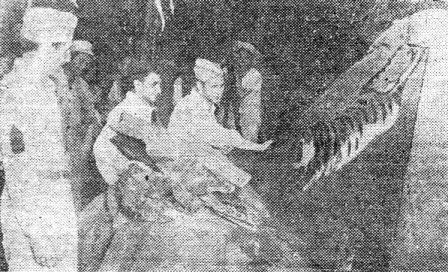 Looks here as if it takes a Tiger to catch a tiger. When a 14th Air Force fighter recently shot down this Jap
photo-recon plane, they discovered this almost life-size tiger snarling from the tail assembly. However, the Nips,
in their effort to emulate the Flying Tigers, overlooked the important detail of putting wings on their tiger.
Looks here as if it takes a Tiger to catch a tiger. When a 14th Air Force fighter recently shot down this Jap
photo-recon plane, they discovered this almost life-size tiger snarling from the tail assembly. However, the Nips,
in their effort to emulate the Flying Tigers, overlooked the important detail of putting wings on their tiger.
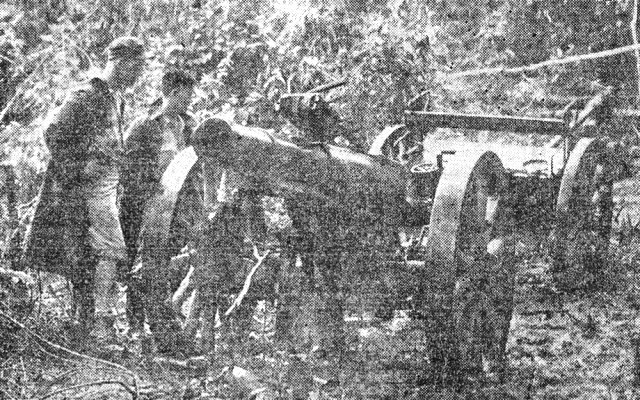 One of the highly-potent Jap 150mm howitzers captured by the Stilwell troops in the Kamaing area. Lt. Frank Irland
and Maj. Chang examine the trophy. The Japs broke the breech before abandoning the weapon.
One of the highly-potent Jap 150mm howitzers captured by the Stilwell troops in the Kamaing area. Lt. Frank Irland
and Maj. Chang examine the trophy. The Japs broke the breech before abandoning the weapon.
